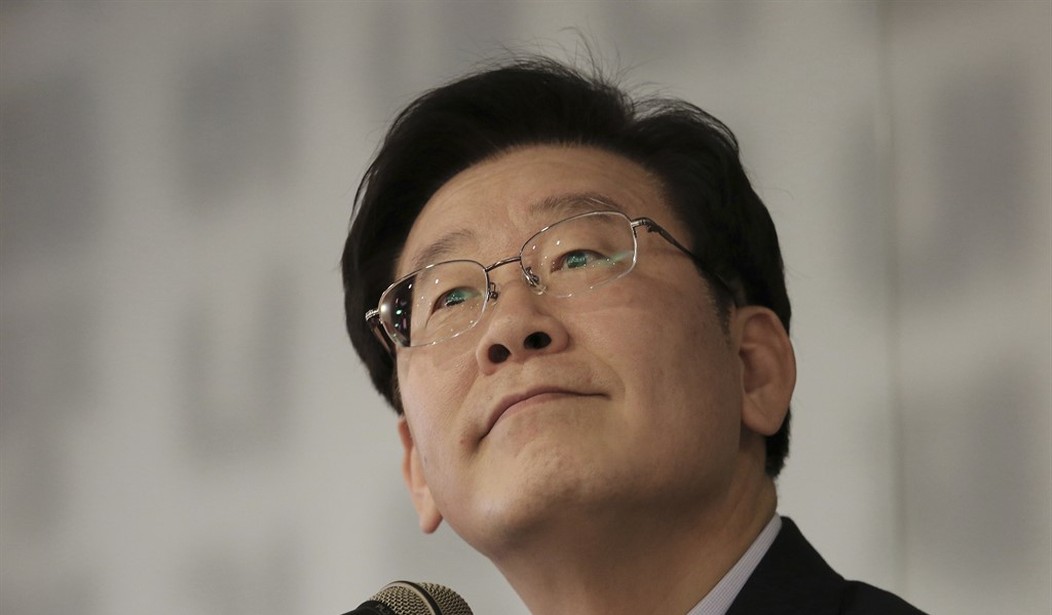Although few Americans may have noticed it, last weekend South Korea’s left-wing Democratic Party selected its next nominee for president for the election in March 2022.
Since the Republic of South Korea's conservative, pro-U.S. President Park Geun-hye was impeached in 2017, the leftist Moon Jae-in and his Democratic Party (DP) have ruled that nation. Moon and his regime have imposed or sought to impose quasi-socialist economic policies, attempted to stifle opposition media and various other forms of criticism and dissent even to the extent of prosecuting critics, largely purged the top government bureaucracy of non-leftists, pressured even some private entities to purge pro-U.S., conservative staff, and harassed defectors who escaped from North Korea to such a degree that a commission of Congress felt compelled to hold a hearing about Moon's crackdown on such anti-North activists.
Perhaps most importantly to Americans, the Moon regime, which is composed at the highest levels up to and including the president's staff and cabinet, of several supposedly "former" anti-American and North Korea-sympathizing radicals, has been cozying up to Communist China, and seeking to appease North Korea even at the price of self-abasement.
The DP's selection of its presidential candidate last weekend presents a risk to the U.S. and the U.S.-ROK alliance, because the chosen nominee is Lee Jae-myung, a leftist whose views seem to be, and policies may turn out to be, even more socialistic and sympathetic to North Korea and China than those of Moon. Lee's views and comments regarding national security issues read like a list of the standard positions of North Korea-sympathizing forces. He favors a relaxation of sanctions on North Korea, supports Moon's legal crackdown on anti-communist North Korean defectors in the ROK sending leaflets into the North, opposed an intelligence-sharing pact with Japan, and condemned former President Park's deployment of the U.S. THAAD anti-missile system in the ROK, all of which are also the positions of Communist China.
Recommended
A January 2017 report from the ROK's Yonhap News Agency, quoting Lee, noted his belief that the ROK could only be a "truly independent" nation if its defense policy was independent of the U.S., which was taken by some commentators, especially pro-U.S. conservatives, to imply that he is not exactly an enthusiastic supporter of the U.S.-ROK alliance, which has maintained peace
in Korea since the end of the Korean War. This suspicion that Lee views the ROK as somehow less than fully independent based on its close historical ties to the U.S. was further reinforced in July 2021, when the ROK's largest newspaper, the Chosun Ilbo, reported that Lee, in defending a radical activist who praised the Soviet role in "liberating" the northern part of Korea in 1945 while denigrating the U.S. role in "occupying" the southern part of Korea at the end of World War II, commented that the ROK was established on an "impure" basis due to what he claimed was the influence of pro-Japanese elements and the presence of U.S. forces in the South from 1945 until 1949, a year after the ROK was officially founded. After those comments, even some moderate politicians denounced Lee for having essentially denied the fundamental legitimacy of the ROK, a position which mirrors that of extreme-left forces in the country, and also North Korea's stance.
Although Lee has in some opinion polls been leading conservative candidates in head-to-head matches, he is not free of scandal, and has been facing several serious accusations of financial corruption, which may eventually, if his malfeasance is proven, cause his level of support to fall. North Korean propaganda media, for its part, seem to be weighing in to defend Lee, by characterizing some of the scandals as political tricks by the conservative opposition. From a national security point of view, however, what most concerns pro-U.S. conservatives in the ROK, including former leftists who are familiar with Lee's background, are not Lee's call for a universal basic income, as economy-crippling as that would be, but rather the reports and accusations centering on Lee's ties to a shadowy pro-North Korean organization known as the "Eastern Gyeonggi Union." This group adheres to North Korea's Juche ideology, and some experts on pro-North forces believe it was deeply influencing the city government of Seongnam when Lee was serving as the city's mayor. In terms of U.S. politics, this would be the equivalent of a presidential candidate having ties to a pro-Soviet group during the Cold War, or perhaps a candidate having friendly ties to former Weather Underground leaders.
Of course, doing what clever but deceitful leftist politicians from Sacramento to Seoul excel at prior to election day, Lee is now attempting to convince low-information voters that he is really just a moderate. To be specific, Lee has recently been trying to portray himself as being much more of a realist in terms of North Korea policy than Moon, and implying that he would not be as willing as Moon to bend over backwards to appease the North and China. However, this new trick to win votes will likely fool few people other than non-Korean commentators who are not familiar with Lee's background and views, and who rely for their news about Korean politics on the biased reporting of certain English-language media in the ROK or on some left-leaning foreign correspondents in Seoul who are biased due to their sympathy for Lee's Democratic
Party. This is reminiscent of a scene from a British comedy film of 1939, in which several men are trying to ascertain the date of a torn newspaper clipping they are reading, and who decide that it must be rather recent, since it features an article quoting Prime Minister Neville Chamberlain as saying that "We must be prepared. England must be strong" They all concede that the arch-appeaser Chamberlain has "only talked like that lately."
It remains to be seen if the ROK's pro-U.S., conservative opposition party, the People Power Party, will nominate a presidential candidate who is able to defeat Lee, and thus maintain and re-vitalize the U.S.-ROK alliance, preserve the freedom and independence of the ROK from North Korea and Communist China, and reverse some of the Moon regime's failed policies and attempts to radically transform Korean society. As Americans, the choice for whom we root should be quite clear.

























Join the conversation as a VIP Member